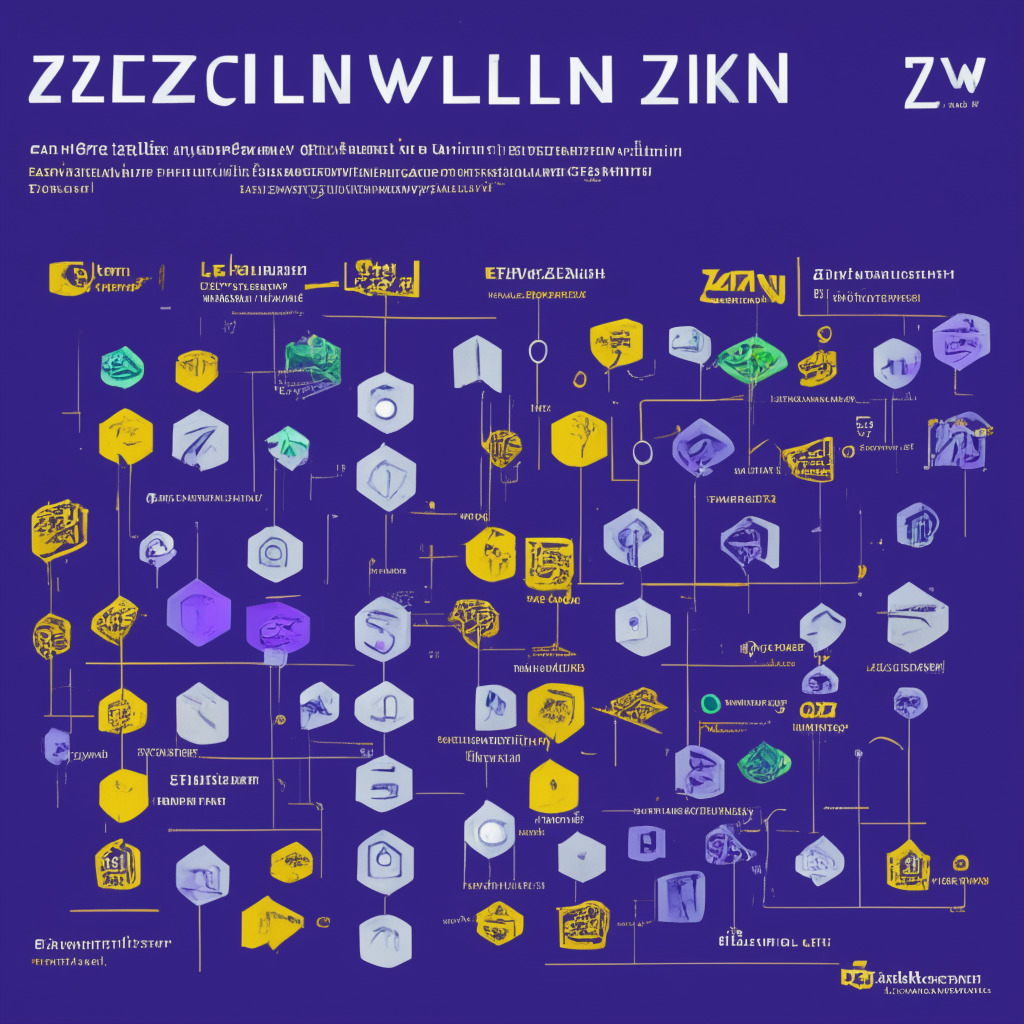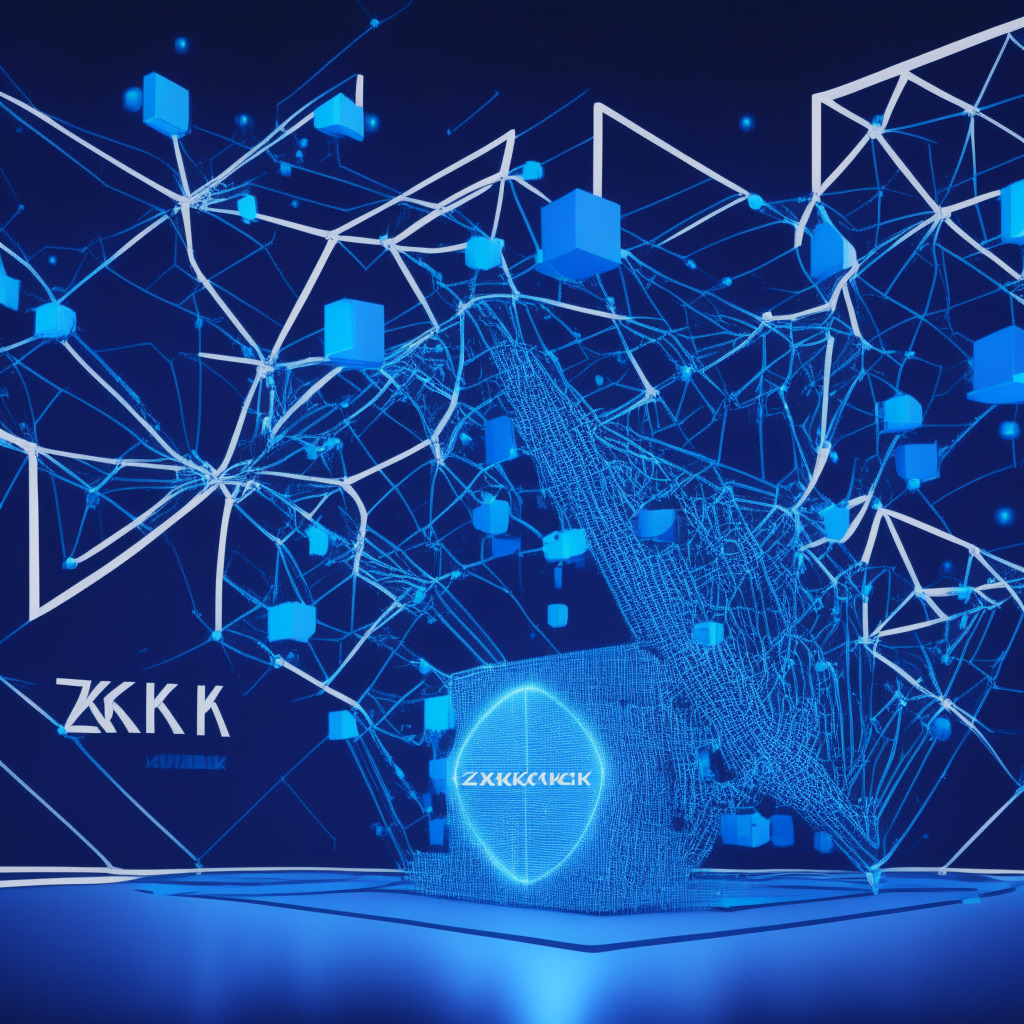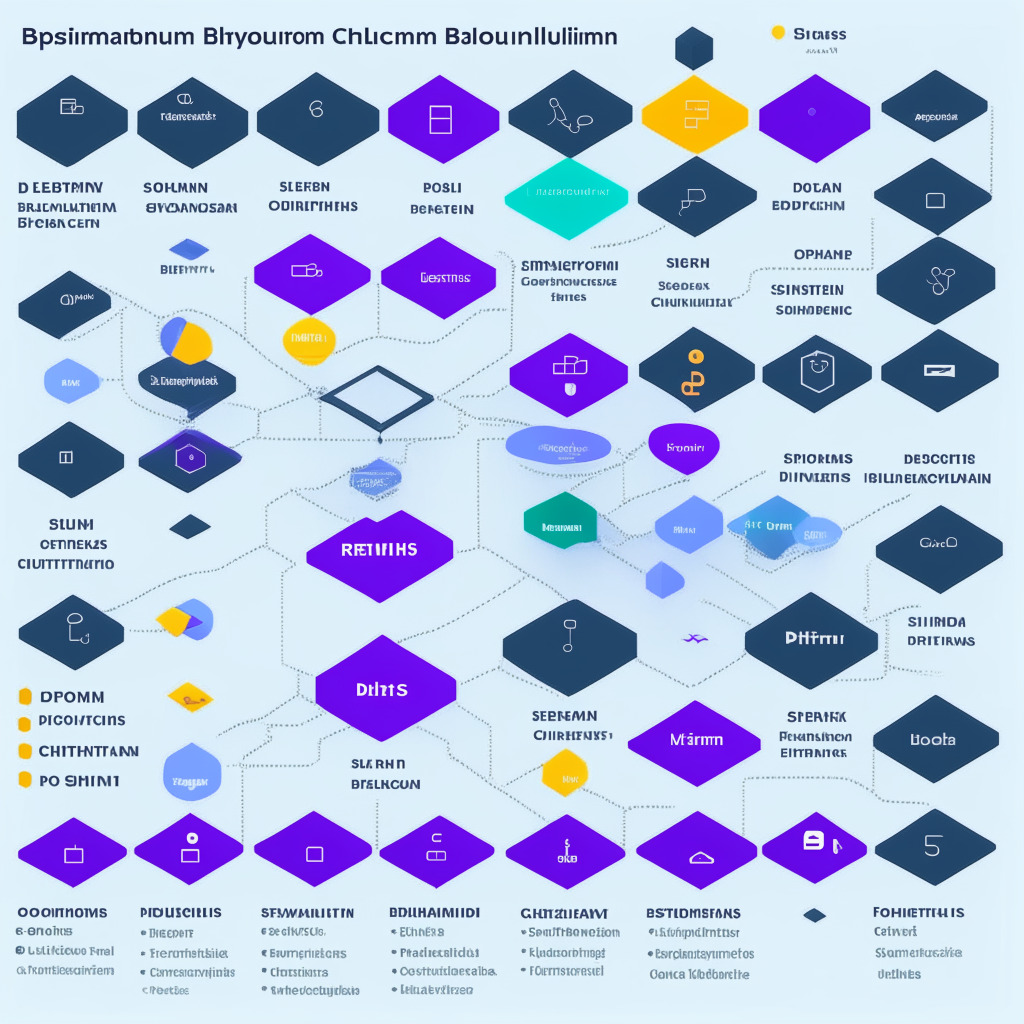Ethereum’s high-performance scaling solution, Polygon zkEVM, has witnessed significant success with a new all-time high in transaction volume and a 70% increase in Total Value Locked. Polygon zkEVM offers enhanced privacy, security, low transaction fees, and quick confirmation times, making it highly attractive for financial applications.
Search Results for: Polygon zkEVM
Polygon 2.0: zkEVM Validium Upgrade for Improved PoS Chain – Pros, Cons, and Conflict
Polygon Labs proposes upgrading its proof-of-stake (PoS) chain to a zkEVM validium to improve security and performance. The upgrade addresses issues like fast block times affecting gas estimation and chain reorgs while integrating zero-knowledge proofs into the infrastructure. Implementation is expected by Q1 2024 if accepted.
Polygon PoS Upgrade to zkEVM Validium: Security vs Scalability vs Decentralization Debate
Polygon co-founder Mihailo Bjelic proposes an upgrade to the Polygon PoS network, suggesting a shift to a “zkEVM validium” version for increased security through zero-knowledge proofs. This upgrade would enable Polygon zkEVM for high-value transactions, offering lower fees and enhanced security from Ethereum’s features, targeting applications like Web3 gaming and social media.
Exploring Polygon PoS Upgrade to zkEVM Validium: Scalability, Security, and Future Prospects
The Polygon Labs engineering team proposed an upgrade to Polygon Proof-of-Stake (PoS) sidechain, transitioning to ‘zkEVM Validium,’ an Ethereum-secured Layer 2 network secured by zero-knowledge proofs. Targeted for Q1 2024, this upgrade aligns with Polygon 2.0’s vision and aims to enhance scalability, security, and interoperability within the broader cryptocurrency ecosystem.
Halt the Polygon Party: 0VIX Exploit Exposes Struggles in POS and zkEVM Territory
Polygon lending protocol 0VIX has announced a temporary halt to its POS and zkEVM operations […]
Google Cloud’s Role as a Polygon Validator: Implications and Confrontations in Decentralization
Google Cloud’s partnership with Polygon, an Ethereum Layer 2 protocol, strengthens the growing trust in blockchain’s role in our digital future. Google’s entry as a validator bolsters security, and implicates its infrastructure employed by high-traffic platforms, as part of web3 collaborations.
Bull Meets Bear: Dissecting Polygon’s Resilience Above $0.50 Amid Bearish Sentiments
Despite market uncertainties, Polygon’s (MATIC) resilience above the $0.50 mark, robust upgrades, collaborations, and rewarding loyalty programs align with bullish sentiments, dwindling the likelihood of the token trading below $0.50. However, future market fluctuations remain unpredictable in the crypto rollercoaster.
Unveiling the Future: How Polygon’s $1 Billion Bet on ZK-Rollups Revolutionizes Blockchain Technology
Polygon co-founder Sandeep Nailwal believes strongly in the potential of zero-knowledge proof (ZK-proof) technology for Ethereum scaling, as evidenced by allocating $1 billion towards its development. Nailwal proposed a unified scalability system where recursive ZK-proof technology merges different blockchain ZK-proofs into a common layer, dramatically improving cross-chain transaction times.
Unveiling Polygon’s Open Source Developer Stack: Scalability Promise vs. Skepticism
Polygon’s new open-source sidechain developer stack is set to power Layer 2 solutions on Ethereum, backing its commitment to the evolution of the Ethereum ecosystem. Key to this advancement is the integration of zero-knowledge proof technology, considered critical for the scaling of the Ethereum blockchain. However, critics raise concerns about potential inefficiencies and differing architecture.
Exploring Immutable’s zkEVM: A Game Changer for Web3 Gaming or a High Risk Load?
Immutable is testing its new blockchain technology layer, zkEVM, aiming to reduce reliance on singular network infrastructure. The zkEVM, designed to lower gas fees and boost transaction rates, seamlessly integrates with the Ethereum Virtual Machine, enabling easy transition of existing smart contracts. However, developer autonomy brings potential risks and challenges in infrastructure connectivity.
Shifting the Gaming Landscape: Immutable zkEVM and the Unpredictable World of Crypto
Immutable’s zkEVM, a Ethereum-compatible gaming platform developed with Polygon Labs, has begun public testing. This platform uses zero-knowledge proofs to secure transfers, decreasing development costs and enhancing security. However, Ethereum founder Vitalik Buterin warns it may cause data inefficiency and latency issues.
Scalable Solutions Propel DeFi: A Look into zkEVM Rollups and Linea Integration
“The integration of Consensys-developed scalable solution, Linea, by Symbiosis—a prominent DeFi liquidity protocol, could revolutionize the landscape by effectively addressing the scalability challenge. Layered scalable solutions like zkEVM rollups, aim to resolve cross-chain/multi-chain issues, improve processing efficiency and secure cross-chain trading.”
Unraveling the Intricacies of Polygon’s Token Strategy: Maturing from MATIC to POL
Polygon, an Ethereum scaling solution, plans to change its native token from MATIC to POL. Touted as a “3rd generation token”, POL optimizes user experience across the protocol’s layer 2 ecosystem and enables holders to earn rewards as validators across multiple chains. This change prompts validators to embrace multi-chain roles, yielding varying rewards and potentially significant benefits.
Unpacking Polygon’s Proposal: From MATIC to POL, a Multipurpose Token Revolution
Polygon has proposed an upgrade to transform its MATIC token into a multipurpose one, now called POL. If approved, POL will be capable of serving multiple chains across all Polygon protocols without security compromise. This will introduce features like limitless scalability and seamless transitions, paving the way for broader blockchain use-cases and potential mass crypto adoption.
Navigating Blockchain Complexity: Polygon Copilot’s AI Promise & Privacy Concerns
Polygon Labs introduces no-code AI platform, Polygon Copilot, to simplify understanding of Polygon (MATIC) for blockchain enthusiasts. This AI-powered guide extracts insights from public documentation and Web3.0 content, catering to diverse user needs in NFTs, DApps, gaming, DeFi, and social networks. Despite potential drawbacks, Polygon Copilot aims to bring accessibility to the complex world of blockchain technology.
Polygon’s ZK Technology Upgrade: Boon or Bane for Blockchain’s Future?
Polygon aims to make its primary chain compatible with zero knowledge (ZK) technology, potentially transforming it into a zkEVM validium and ensuring Ethereum Virtual Machine compatibility. This upgrade could enhance security, eliminate reorgs, expedite transactions, and scale the blockchain more effectively. However, the complex integration may introduce unforeseen challenges.
The Arrival of Polygon 2.0: Transforming Internet & Blockchain with ZK Technology
Polygon Labs announces “Polygon 2.0,” a set of upgrades designed to establish the “Value Layer” of the internet, enabling users to create, exchange, and program value online. Powered by Zero-Knowledge (ZK) technology, Polygon 2.0 aims to support limitless chains and seamless cross-chain interactions, potentially transforming internet use and blockchain integration while facing regulatory challenges.
Deutsche Telekom Embraces Blockchain by Supporting Polygon: Analyzing the Partnership
Deutsche Telekom enters blockchain sector by supporting Polygon infrastructure as a validator, aiming to boost security and decentralization. The partnership is expected to unlock ownership and autonomy, making Web3 technology more accessible and encouraging businesses to embrace blockchain via Polygon.
Ethereum Scaling Meets Telecom Giant: Exploring Polygon and Deutsche Telekom Partnership
Deutsche Telekom partners with Ethereum Layer-2 scaling platform Polygon, joining as one of the 100 validators on its Proof-of-Stake (PoS) network. The collaboration aims to improve the Ethereum ecosystem and strengthen Polygon’s protocol security, governance, and decentralization, attracting attention across multiple industries.
How Reddit and Polygon Paved the Way for NFT Adoption and Web3 Synergy
Reddit’s NFT launch on the Polygon platform successfully onboarded 9.7 million users within ten months, driving substantial user engagement. Collaborations with brands like Nike, Starbucks, and Sotheby’s demonstrate Polygon’s credibility as it aims to become the “value layer of the internet,” aligning with the growth of cryptocurrency and blockchain technology.
Manta Network’s Leap Forward: Gains and Regulatory Risks in Layer 2 Solutions
“Manta Network has launched its zero-knowledge proof layer 2 scaling network, an innovative platform for ZK-enabled DApp development. This introduces increased throughput and reduced gas fees, promising future DApps realm expansion. However, challenges and regulatory issues, as highlighted by the Celsius incident, suggest the need for careful navigation in blockchain tech.”
Chronicle’s Leap Forward: Lower Gas Fees, More Networks and Integrity Questions Unanswered
“Chronicle, the second-largest oracle provider, is set to expand its services to other networks, thereby introducing more competition to the oracle landscape. The Chronicle Protocol aims to reduce gas fees by 60% envisioning higher platform utilization and maintaining uncompromised data integrity with data origin monitoring user dashboards.”
Navigating the Future of Blockchain: Innovation Progress Spurred by Cryptography, Regulation and Social Integration
“Binance Labs has invested in Delphinus Lab, a project exploring zero-knowledge cryptography in WASM environments. Meanwhile, Num Finance has launched a Colombian peso-pegged token on the Polygon network, with the potential regulatory scrutiny. Elsewhere, Unstoppable Domains has released a messaging feature for secure blockchain-based social interaction.”
PancakeSwap v3’s Expansion to Linea: A Revolution in DeFi or High-Risk Gamble?
PancakeSwap v3 recently launched an expansion to the Linea mainnet, aiming to attract a broader user base and boost revenue. The platform extends beyond Ethereum, into platforms including BNB Chain, and offers improved swap and liquidity provision functions. However, while promising, it’s crucial to understand the inherent risks involved.
Crypto Whales Making Waves: Diving into their Investment Strategies and the Future of Blockchain
“Crypto whales have been investing heavily in Ethereum-compatible blockchain, Base, along with other layer 2 networks. These investors have shown a strong alignment towards crypto, bridging over 100 ETH and diversifying across various Ethereum scaling options. This trend reveals the swift shifts of attention and investments in the dynamic crypto world.”
PancakeSwap Jumps onto the Arbitrum Train: Faster Transactions, Lower Fees and Risks Involved
“PancakeSwap, a leading decentralized exchange, announced its operations on the Ethereum scaling network, Arbitrum. The aim is to increase user base and revenue streams, offering faster transaction times, low fees, and expanding the decentralized finance (DeFi) space.”
Unleashing the Future: The Role of AI-Driven DAOs in Reshaping the DeFi Landscape
“Former BitMex CEO Arthur Hayes envisions a future where Decentralized Autonomous Organizations (DAOs) powered by AI could revolutionize the DeFi space. These AI DAOs, such as PoetAI, offer transparency, resilience against government control, and operational efficiency through cryptocurrencies like Ethereum. Platforms like Ethereum could greatly benefit from this new DeFi landscape. However, questions remain about the maturity of the DeFi arena and the readiness for fully autonomous DAOs.”
Rapid Scaling of Ethereum: Harnessing the Power of ZK-Proofs and the Challenge of Off-chain Computations
“The Ethereum ecosystem is encouraging competition, with many firms developing Zero-Knowledge Scaling solutions. This technology enables secure off-chain computations and only light, non-data-revealing proofs on the Ethereum mainnet. Despite its efficiency, questions arise about the sustainability and security of off-chain transaction computations.”
Binance’s Suspension Decision: Weighing the Impact on the Multichain Project
“Binance is suspending operations regarding deposits and withdrawals of specific cross-chain bridge tokens tied to the Multichain project from July 7, 2023, following unresolved issues with the protocol. Notably affected tokens include Polkastarter, Alchemy Pay, and Beefy.Finance among others.”
Ethereum Scaling Showdown: zkSync Era Surpasses $500M TVL – Winners, Losers, and Future Impacts
Matter Labs’ zkSync Era, a zero-knowledge rollup technology for scaling Ethereum, has seen its total value locked (TVL) surpass $500 million. This reflects a 12% growth in one week, indicating strong demand for advanced scaling solutions in the decentralized finance (DeFi) space.
Optimism’s Bedrock Release: Lower Gas Costs, Modular Future, and Scaling Solutions Face-Off
Optimism’s Bedrock release has significantly reduced gas costs, with average fees per transaction decreasing by 74.5% in USD and 73.9% in ETH. This upgrade prepares Optimism for a Superchain future and emphasizes collaboration in the interchain world, driving innovation and benefiting users and developers.
Simplifying Layer-2s: Connext’s Chain Abstraction vs Other Bridge Solutions
Interoperability protocol Connext introduces chain abstraction to enhance layer-2 experience, simplifying transactions across multiple decentralized applications on different chains. This trustless, fast technology plugs into native bridges to provide a seamless experience, countering fragmentation caused by the continuous launch of layer-2s and layer-3s.































